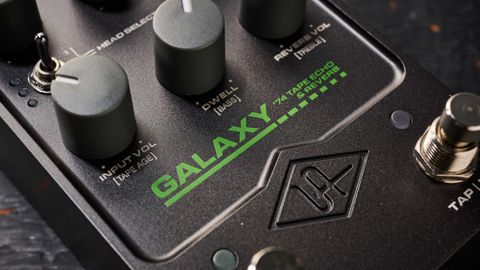Universal Audio UAFX Galaxy '74 Tape Echo & Reverb pedal: What is it?
It's typical isn't it; you wait for a Space Echo reissue and then four come along. Ok, two of those aren't even Roland (Boss) units but we really are spoilt for choice right now.
Before anyone can cause UA of being a Johnny-come-lately in this arena, it already had a plugin version (originally the RE-201, later renamed the Galaxy Tap Echo).
We know that's very good, but how does the hardware version fare; especially now it's up against the acclaimed digital replications of the Boss RE-202, compact RE-2 and Nux Space Echo-inspired NDD-7 Tape Echo?
The original Space Echo unit of the '70s answered the call of echo enthusiasts tired of fragile, temperamental machines with a customisable dream machine that still casts a legacy of influence that continues to win favour for its cosmic, warm and versatile multi-head tape delay and spring reverb combinations.
It's beloved by Jonny Greenwood, Pink Floyd, Brian Setzer and was a go-to for dub and reggae pioneers including Lee Scratch Perry and Bob Marley amongst many others.

The black and green livery is an undeniably strong link to the Galaxy '74's inspiration, as well as a sleek look with the blackout control knobs. The size is bigger than the RE-2 but smaller by a considerable margin than the bells and whistles of the RE-202 – a pedal that offers four onboard presets while this has… none.
Deja vu strikes from our experiences with the preset-less Del-Verb delay and reverb; part of UA's third wave of UAFX effects pedals alongside this and the Max Preamp & Dual Compressor.
The RE-202 also comes in around the same price as this. The Galaxy '74 has tough competition beyond its slimmer size there.

Universal Audio UAFX Galaxy '74 Tape Echo & Reverb pedal: Performance and verdict
It's not quite as intuitive on the control side as the Del-Verb, but that's because the Space Echo format dictates more from the UAFX layout.
The Alt switch that doubles up the three of the six control knobs to activate secondary tape echo parameters of Tape Age, Dwell and Treble suggests Boss was wise to go with a larger physical size for its flagship pedal.
The Galaxy '74 is packing a lot in here into a smaller footprint so it's an understandable workaround bearing in mind UA is sticking with the user-friendly idea of a six-knob / two-switch format.
At its heart this pedal is a high-end, detailed digital recreation of lo-fi sounds
At its heart this pedal is a high-end, detailed digital recreation of lo-fi sounds; the reverb sounds decidedly so to my ears… which is a good thing.
It can be set in the UA Control mobile app to be independently switchable on the second footswitch, but the rub is you'll lose tap tempo and the ability to hold and ramp up (or down if you set it that way on the app) feedback-pushing self-oscillation for full freak-out intros and outros. A choice you don't have to make on the three-footswitch RE-202.
The reverb here can be viewed as a bonus to the main event – it's also been updated from the plugin – but it's a very usable and attractive one indeed. With two controls via the level and Dwell, it's a refreshingly streamlined affair in this era of deep-diving reverb pedals but can provide a pleasing range.
Dwell is the key to that lo-fi element and a really welcome feature here; adjusting the level of drive into the virtual reverb tank to bring in some frayed edges as required. Not just great for rock n' roll excursions but also adds a sense of dimension to moodier parts.
As a simple, authentically vintage-sounding go-to it's a success. And the lack of the Spring '65 algorithm's surfy Fender 'drip' (as found in the excellent UAFX Golden Reverberator and Dream '65 Amp Emulator) may well be preferred here by some players.

That's a tasty side order, but the main dish here digitally modelled is multi-head tape delay to combine with it (or not). And, it's not really a surprise to us to find UA has served up a treat.
A mini toggle selects virtual Heads 1, 2 and 3 with seven total combinations of them that can be cycled through by continuing to switch up or down with green LEDs letting you know what heads are activated.
On the original Space Echo, the different heads are added to the spinning tape and combined to create different types of delay and quirks; short to long delays with multi-tap too.
That's exactly the case here in the digital realm. The Input Volume control is like the Dwell for the reverb; turn it up and it drives the tape echo harder. The alt Bass and Treble controls allow you to EQ the repeats, as well as adjusting Tape Age (the higher the setting the older the tape for increased warmth and warble).

The primary controls you'll probably head to first are the Echo Rate, Feedback and Voume. Set the Feedback low, Echo Rate at midday on the first Head for rockabilly slapback thrills.
Moving to the second head lengthens your delay time, with layered repeats, and you can explore why reggae artists like Bob Marley loved the original Space Echo. To lock in on the rhythm you'll need to set tap tempo in a way the original unit couldn't and for Head 1 that equates to dotted 16th notes, Head 2 Dotted 8th notes and quarter notes on Head 3.
Combining the heads can take you into the progified lands of Radiohead and Floydian soundscaping and glitches, with the response of the virtual tape responding to your changes and sounding eerily real.
UA has clearly put a great deal of focus on the changing character of wow and flutter tape modulation (there is no 'modulation' control on a Space Echo but the Boss unit uses a Wow & Flutter knob for injecting more or less of this) moving between and combining heads, with the treble and bass allowing you to fine-tune it all in the maelstrom.
It shows yet again how far modelling continues to develop and why UA is at the forefront with its years of plugin prowess paying dividends.
It's this kind of thing that reminds us how much Space Echo-influenced pedals often encourage you to orchestrate and manipulate them via the controls, and this is no exception.
Especially with that 'performance' hold function to ramp up or down the oscillation on the second footswitch when you're in tap tempo mode. It's good to see it all in a smaller unit compared to the Boss RE-202, but with more expansive controls than the RE-2.

UA has gone even further for those using the Galaxy in stereo mode; something few of us will take advantage us but an unexpected feature all the same.
The one-page overview in the box doesn't mention it but the Galaxy '74 runs separate stereo instances of each reverb and delay.
This means you can get some contrasts in character within the stereo field, just like you would with two Space Echoes, as each does its thing.
We think at least one preset option should be present on a pedal with this much nuance and usability
With the lack of any onboard presets and MIDI you'll be tweaking between songs or/and tap dancing if you really want to explore the scope here.
There's also none of the additional preset Voicings available via UA's mobile Control app – sounds we enjoyed so much on the Del-Verb and helped negate the lack of footswitchable presets – that bring in extra effects into the mix that you can download onto the pedal.

What you see is what you get. And this being a Space Echo-inspired pedal, there's a lot to explore in the box.
Of course, not everyone is out there gigging, but most of us players appreciate having a go-to favourite sound (or four) to access quickly - especially in a digital realm where tech can be authentic while expanding in ways the original technology couldn't.
The launch price here is slightly cheaper than the two series of pedals that preceded it – and we can't help noting the packaging quality is less premium in this third wave – but I think at least one preset option should be present on a digital pedal with this much nuance and usability. It's a headscratcher.
UA keep knocking it out of the park in the key area of tones and the instant gratification of plugging in their pedals and finding inspiration, but we think the preset question hanging over this release is more conspicuous than for any pedal it's put out before.
Still, the bottom line remains; this is still a fantastic-sounding reverb and echo pedal that captures so much of the Space Echo's charm for the modern pedalboard (just don't mention MIDI, ok?).
MusicRadar verdict: Despite the frustrating lack of any onboard presets available, the care and passion UA puts into capturing the classic sounds of the last 60 years are very much in evidence again here in its own homage to the Roland Space Echo.
Universal Audio UAFX Galaxy '74 Tape Echo & Reverb pedal: What the web says
"Given the piggybank-shattering prices, it’s no wonder the UAFX angle up to now has been impeccable audio quality. That’s a little harder to judge when the effect in question is slightly lo-fi by nature, but the Galaxy certainly picks up where the Starlight Echo Station left off."
Guitar.com
Universal Audio UAFX Galaxy '74 Tape Echo & Reverb pedal: Hands-on demos
Pete Thorn
Corey Congilio
Vintage King
Sarah Longfield
Reverb
Universal Audio UAFX Galaxy '74 Tape Echo & Reverb pedal: Specifications

- TYPE: Digital stereo multi-head tape delay and reverb modeling pedal
- ORIGIN: Designed in the USA, made in Malaysia
- CONTROLS: Echo Rate, Feedback, Echo Volume and Input Volume / Tape Age, reverb Dwell / echo Bass, Reverb Volume / echo Treble; Head Select mini toggle switch with seven combinations, echo bypass and Tap/Hold/reverb bypass footswitches
- FEATURES: Mono / stereo inputs and outputs, USB-C input for firmware updates via UAFX Control desktop app, Bluetooth connectivity to UAFX Control mobile app
- BYPASS: Buffered
- POWER: 9V centre-negative power supply (400mA minimum draw, power supply not included)
- CONTACT: Universal Audio


